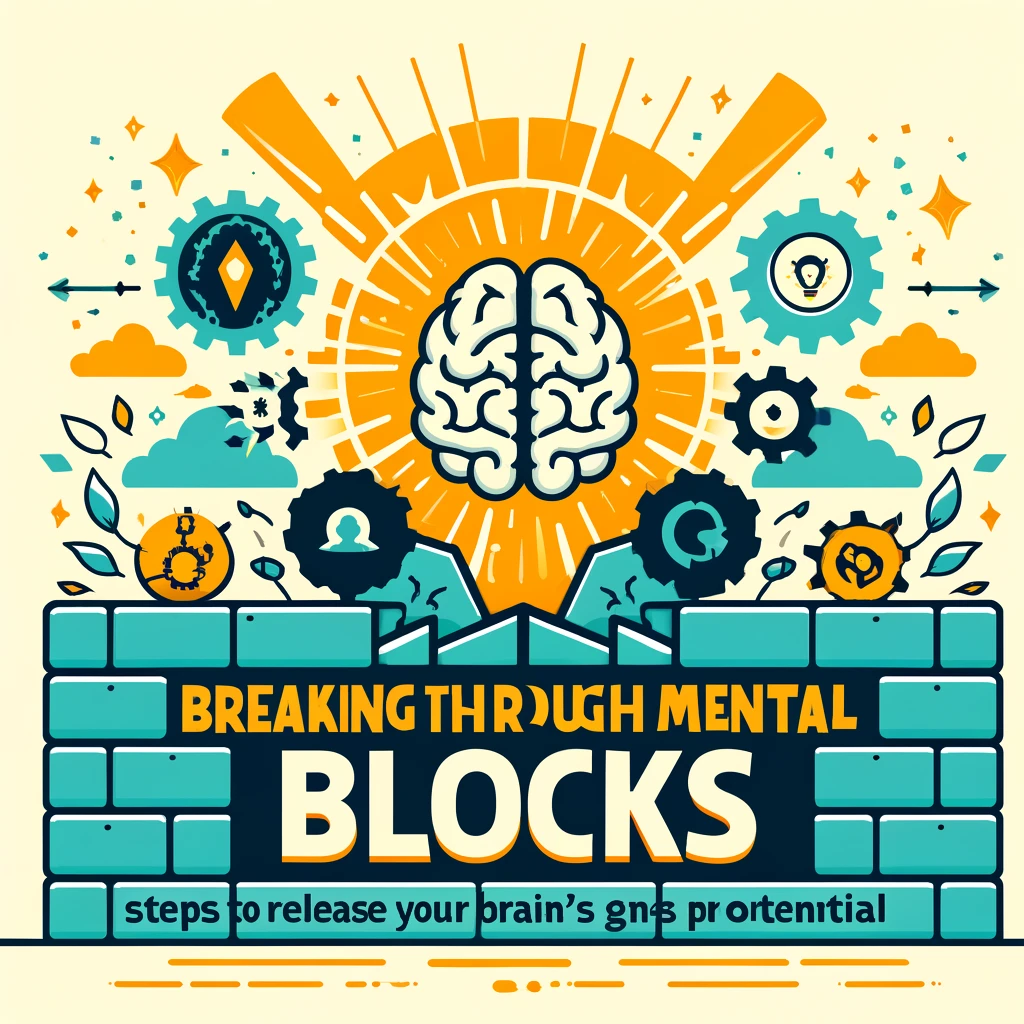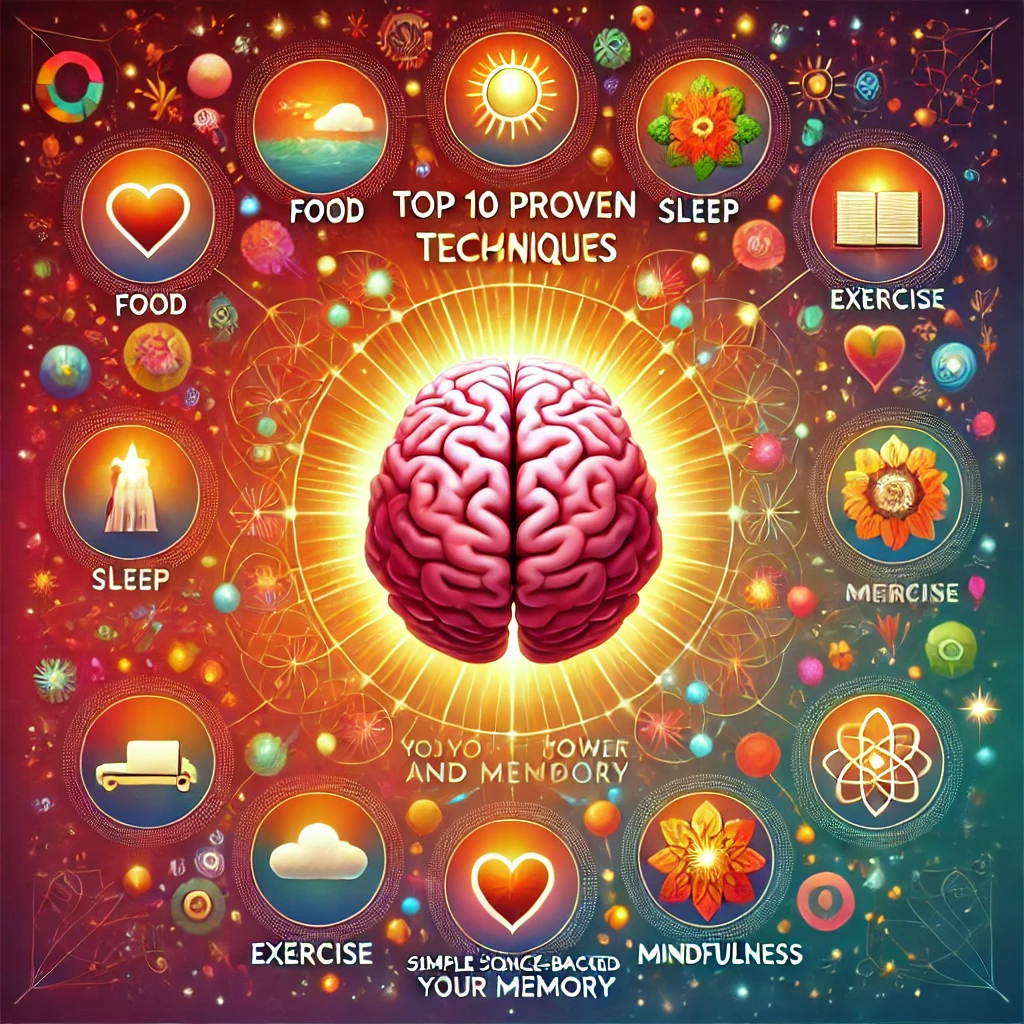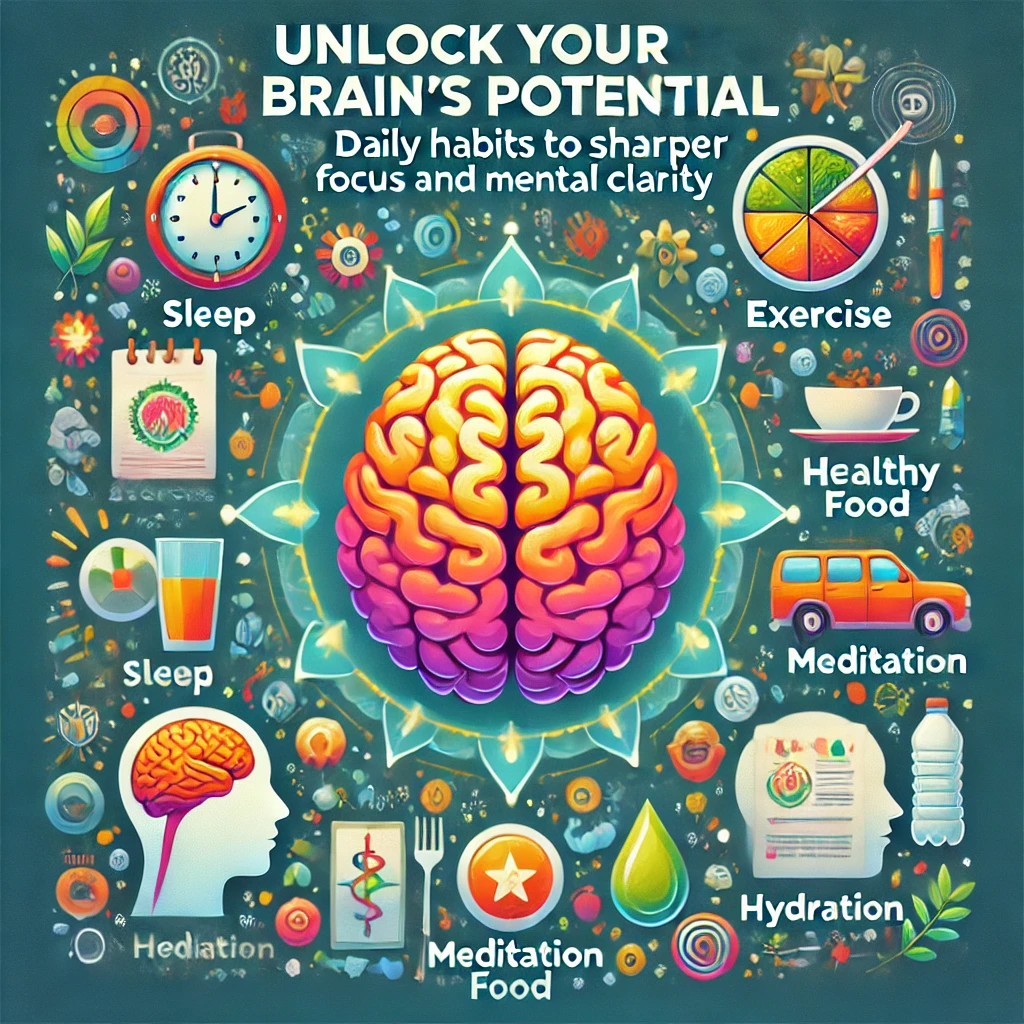Introduction
We’ve all been there: staring at a blank page, feeling stuck on a project, or mentally spinning our wheels without making progress. Mental blocks can be frustrating and draining, holding us back from reaching our full potential. But what if you could learn techniques to overcome these barriers and release your brain’s full potential?
In this article, we’ll explore practical steps to break free from mental limitations, improve cognitive function naturally, and unlock new levels of mental clarity and focus. By using specific strategies, you’ll find it easier to overcome mental blocks and discover what your mind is truly capable of.
1. Understand the Root of Mental Blocks
Before diving into techniques for overcoming mental blocks, it’s helpful to understand why they happen. Mental blocks can be caused by stress, self-doubt, lack of focus, or even physical factors like fatigue or dehydration. They’re your brain’s way of signaling that something isn’t working and that it’s time to take a step back and reassess.
Common causes of mental blocks:
- Stress and anxiety: High stress levels can cloud your mind and make it difficult to think clearly.
- Perfectionism: The pressure to achieve perfection can create mental blocks by making you overly cautious.
- Lack of focus: Distractions and multitasking can make it difficult to enter a focused state.
- Physical factors: Poor sleep, dehydration, and lack of exercise can contribute to mental fog.
Relatable anecdote:
I remember a time when I was working on a challenging project and felt completely stuck. After hours of frustration, I realized I hadn’t eaten or taken a break all day. Once I took a short walk and had a snack, I came back with a clear mind and finally broke through my mental block. Sometimes, a simple break or self-care routine can make all the difference.
2. Take a Break to Reset Your Mind
When you’re stuck, one of the best things you can do is take a break. Stepping away from the task gives your brain a chance to reset, allowing you to return with a fresh perspective. Breaks aren’t just about resting; they’re about giving your mind a chance to make new connections and process information.
How to take effective breaks:
- Go for a walk: Physical movement, especially outdoors, can boost creativity and improve mental clarity.
- Practice deep breathing: Taking deep breaths helps reduce stress and clears mental fog.
- Try a quick meditation: Even five minutes of meditation can improve focus and help you come back to your task with renewed energy.
Example:
A friend of mine is a writer and swears by a five-minute walk whenever she’s stuck. She says it’s like “rebooting” her brain, and when she returns, she often has fresh ideas and renewed energy.
3. Challenge Your Inner Critic
One of the biggest obstacles to releasing your brain’s full potential is self-doubt. When we’re overly critical of ourselves, it’s easy to become paralyzed by fear or indecision. Learning to quiet your inner critic is a powerful step in overcoming mental blocks and unlocking your brain power.
Techniques to challenge self-doubt:
- Recognize negative thoughts: Notice when you’re being overly critical and remind yourself that it’s okay to make mistakes.
- Reframe your mindset: Instead of thinking, “I can’t do this,” try saying, “This is challenging, but I’ll learn from it.”
- Celebrate small wins: Acknowledging your progress, no matter how small, can build confidence and reduce mental blocks.
Relatable anecdote:
I used to be my own worst critic, especially when trying something new. I’d get stuck in a cycle of negative thoughts that prevented me from moving forward. Once I started celebrating even small accomplishments, it boosted my confidence and helped me overcome my mental blocks.
4. Engage in Brain-Boosting Physical Activity
Exercise is one of the most effective ways to improve cognitive function naturally. Physical activity increases blood flow to the brain, releasing endorphins that reduce stress and enhance mental clarity. Engaging in regular exercise can help you break free from mental limitations and improve your focus.
Types of exercise to boost brain power:
- Aerobic activities: Running, biking, and swimming are great for increasing oxygen flow to the brain.
- Yoga and stretching: Yoga combines physical movement with mental focus, helping to reduce stress and improve clarity.
- Strength training: Lifting weights builds discipline and mental toughness, which can help overcome mental blocks.
Example:
I started adding a short yoga session to my mornings, and it transformed my mental clarity throughout the day. The combination of movement and mindfulness helped me feel more focused and less likely to get stuck in mental blocks.
Pro tip:
Even a quick 10-minute walk can make a difference. When you’re feeling mentally stuck, try moving your body to reset your mind.
5. Use Visualization Techniques
Visualization is a powerful mental tool for overcoming mental blocks and increasing brain capacity. By picturing yourself successfully completing a task, you train your brain to believe it’s possible, which reduces fear and hesitation.
How to practice visualization for mental clarity:
- Imagine success: Picture yourself completing the task confidently and effectively.
- Break down the steps: Visualize each step required to achieve your goal, which can make the task feel more manageable.
- Use positive affirmations: Combine visualization with affirmations like, “I am capable and focused,” to reinforce confidence.
Relatable anecdote:
When I’m preparing for a presentation, I take a few minutes to visualize myself delivering it smoothly. I imagine the audience engaged and myself speaking confidently. This practice calms my nerves and helps me overcome mental blocks related to public speaking.
6. Practice Brain Dumping for Mental Clarity
Brain dumping is a technique that involves writing down all your thoughts on paper. By clearing your mind of random thoughts, ideas, and worries, you make room for mental clarity and focus.
Steps for effective brain dumping:
- Set a timer: Dedicate five to ten minutes to jotting down everything on your mind.
- Write freely: Don’t worry about structure or grammar; just let your thoughts flow.
- Organize if needed: Once you’re done, organize your notes into actionable tasks if it helps reduce stress.
Example:
I use brain dumping whenever I feel overwhelmed. Getting my thoughts on paper clears my mind, and I can focus more easily without feeling like I have a million things swirling around in my head.
Pro tip:
Use a notebook specifically for brain dumping, so you can look back and see if there are recurring thoughts or ideas that need attention.
7. Tackle Challenging Tasks with the Pomodoro Technique
The Pomodoro Technique is a time management strategy that involves working in short bursts, followed by a brief break. This method can improve focus, reduce mental fatigue, and help you break through mental blocks.
How to use the Pomodoro Technique:
- Set a timer for 25 minutes and focus on a single task.
- Take a 5-minute break after each 25-minute work session.
- Repeat for four cycles, then take a longer break of 15–30 minutes.
Relatable anecdote:
A friend introduced me to the Pomodoro Technique, and it was a game-changer. I found that breaking tasks into smaller chunks made them feel less overwhelming, and the short breaks helped prevent burnout.
8. Use the Power of Positive Self-Talk
Positive self-talk is a simple but powerful strategy for boosting mental potential. When you encourage yourself with positive affirmations, you reduce stress and build confidence, making it easier to break through mental blocks.
Examples of positive self-talk for resilience:
- “I can handle this.” Remind yourself that you have the skills and ability to overcome challenges.
- “I am capable of growth.” Focusing on growth rather than perfection helps reduce self-doubt.
- “This challenge is an opportunity to learn.” Viewing challenges positively can prevent mental blocks.
Example:
Whenever I feel discouraged, I repeat a few positive affirmations. It might sound simple, but it has a huge impact on my confidence, and I’m more likely to push through mental blocks.
9. Practice Gratitude to Improve Mental Clarity
Gratitude is a powerful tool for breaking mental barriers. When you focus on the positives, it shifts your mindset, reducing stress and increasing mental clarity. By taking a few moments each day to reflect on things you’re grateful for, you build a positive mindset that supports mental resilience.
How to practice gratitude:
- Write down three things you’re grateful for each morning or evening.
- Reflect on positive moments from the day, which can help reinforce an optimistic mindset.
- Express gratitude to others, as sharing positivity strengthens connections and mental clarity.
Relatable anecdote:
I started keeping a gratitude journal, and it helped me break free from negative thinking patterns. It became easier to handle challenges because I had trained myself to focus on the positives.
10. Focus on One Task at a Time
Multitasking often contributes to mental blocks by overwhelming your brain with multiple inputs. When you focus on a single task, you give your brain a chance to work efficiently, improving mental clarity and helping you break through mental barriers.
Tips for single-tasking to boost mental focus:
- Prioritize tasks: Start with the most important task and give it your full attention.
- Limit distractions
**: Turn off notifications and work in a quiet environment if possible.
- Use a task list: Write down tasks and check them off as you complete each one to stay organized.
Example:
I used to juggle multiple tasks at once, but I often ended up feeling stuck and scattered. When I started focusing on one task at a time, I was able to complete my work more efficiently and with a clearer mind.
11. Seek Inspiration to Refresh Your Mind
Sometimes, mental blocks arise from a lack of inspiration. Seeking out new experiences, ideas, or perspectives can give your brain the boost it needs to break through barriers and improve cognitive function.
Ways to find inspiration:
- Read something new: Books, articles, and podcasts can introduce fresh ideas.
- Connect with others: Conversations with friends or mentors can spark new insights.
- Explore a creative hobby: Painting, drawing, or playing an instrument can engage different parts of your brain.
Relatable anecdote:
I was feeling uninspired with my writing, so I started reading outside my usual genre. The new ideas and perspectives helped me overcome my mental block and reawakened my creativity.
Conclusion
Breaking through mental blocks and releasing your brain’s full potential requires patience, practice, and the right strategies. From mindfulness and positive self-talk to physical activity and focused work techniques, these steps can help you improve mental clarity, overcome obstacles, and unlock greater levels of mental resilience.
Remember, everyone experiences mental blocks. The key is to have tools and techniques at your disposal to help you break through and achieve your goals. By incorporating a few of these strategies into your daily routine, you’ll build a resilient mindset, increase your brain’s capacity, and discover your true potential.
FAQ Section
1. How can I improve mental clarity naturally?
You can improve mental clarity naturally through exercise, meditation, hydration, and practicing gratitude.
2. What are the most effective techniques to overcome mental blocks?
Techniques like taking breaks, using positive self-talk, practicing mindfulness, and focusing on one task at a time are effective for overcoming mental blocks.
3. Does physical activity help release mental blocks?
Yes, physical activity increases blood flow to the brain and releases endorphins, which can improve focus and mental clarity.
4. How does gratitude affect mental clarity?
Practicing gratitude reduces stress and shifts your focus to positive aspects, which promotes a clearer and more optimistic mindset.
5. How can visualization help with mental blocks?
Visualization reinforces confidence and reduces fear, helping you approach challenges with a positive mindset and break through mental barriers.
6. Can the Pomodoro Technique improve mental focus?
Yes, the Pomodoro Technique involves short work intervals and breaks, which can help maintain focus and prevent mental fatigue.
7. What is brain dumping, and how does it help?
Brain dumping is writing down all your thoughts to clear mental clutter, which promotes clarity and reduces stress.
8. How can self-talk help in releasing mental potential?
Positive self-talk reduces self-doubt and builds confidence, allowing you to approach tasks with greater focus and resilience.
9. Is seeking inspiration helpful for overcoming mental blocks?
Yes, new experiences and ideas can reenergize your brain and inspire creative solutions, helping you overcome mental blocks.



